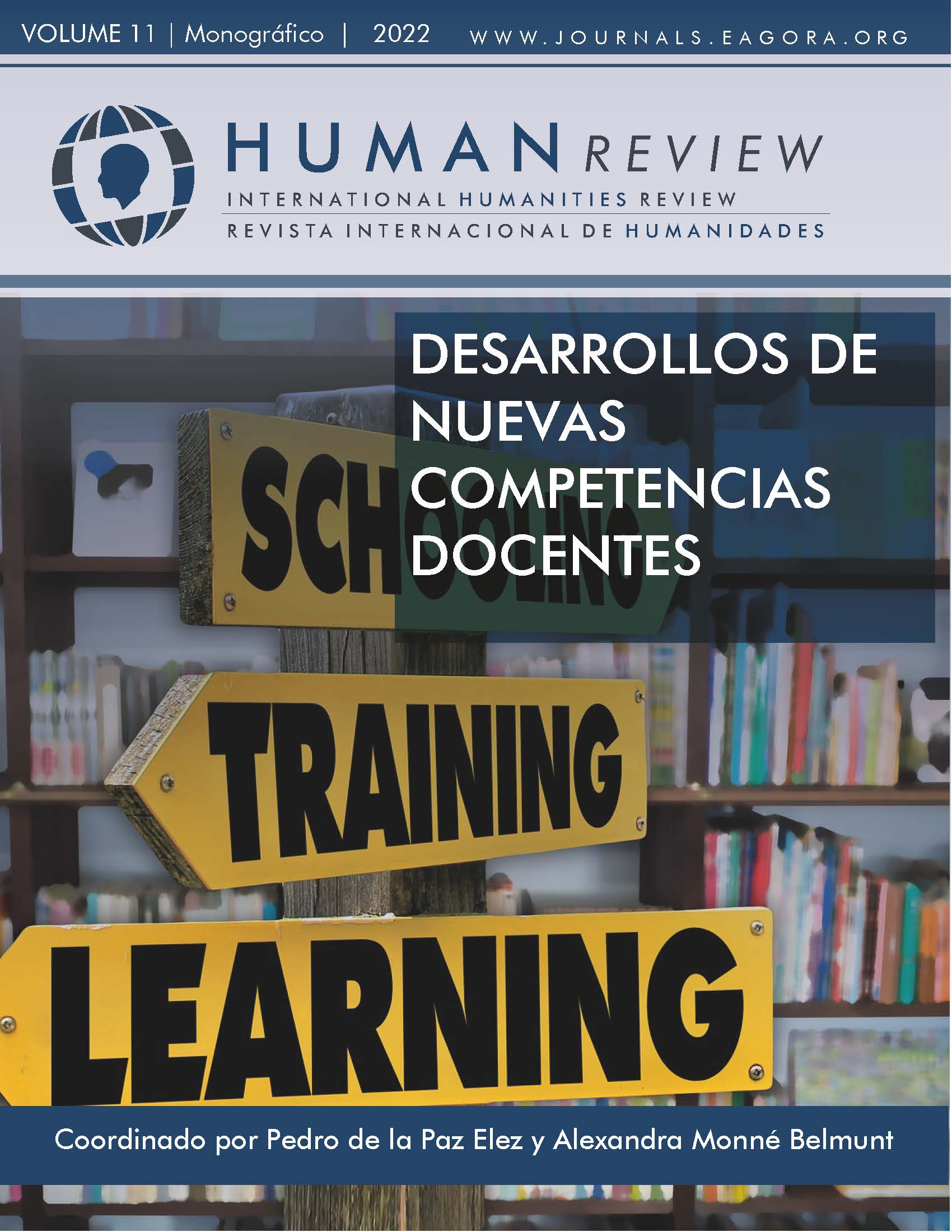Quality of life in primary school: Music in the classrooms
Keywords:
Quality of life, Musical training, Musical education, Primary school, Teachers, Students, Musical genresAbstract
Music training and education in future teachers is not only aimed at teaching and learning music, but also at using music as a tool in the classroom. The proposed objectives are the following: (i) to know the quality of life of the students, future teachers and teachers; (ii) to know the impact of musical education and training in improving the quality of life in future teachers, and (iii) to propose a dossier of musical activities in the classroom to improve the quality of life.
References
Adler, S.E. (2020). La música puede ser una excelente manera de mejorar el estado de ánimo. AARP, 29. https:// bit.ly/39HUJux
Ballena, Catherin L., Cabrejos, Luis, Davila, Yheraldine, Gonzales, Claudia G., Mejía, Gerardo E., Ramos, Vanessa, & Barboza, Joshuan J. (2021). Impacto del confinamiento por COVID-19 en la calidad de vida y salud mental. Revista del Cuerpo Médico Hospital Nacional Almanzor Aguinaga Asenjo, 14(1), 87-89. http:// dx.doi.org/10.35434/rcmhnaaa.2021.141.904
Balluerka Lasa, N., Gómez Benit, J., Hidalgo Montesinos, M.D., Gorostiaga Manterola, A., Espada Sánchez, J.P., Padilla García, J.L. Y Santed Germán, M.A. (2020). Las consecuencias psicológicas de la covid-19 y el confinamiento. Servicio de Publicaciones de la Universidad del País Vasco. https://bit.ly/3GaDi21
Barbera, N., Y Inciarte, A. (2012). Fenomenología y hermenéutica: dos perspectivas para estudiar las ciencias sociales y humanas. Multiciencias, 12(2), 199-205. https://www.redalyc.org/pdf/904/90424216010. pdf
Dhanaraj, M., & Saranya, S. (2020). Relationship between music preference and happiness: a study among college students. Journal of Emerging Technologies and Innovative Research, 7(8), 345-351. https://www.jetir. org/papers/JETIR2008046.pdf
Fox, D. (1981). El proceso de investigación en educación. Publicaciones de la Universidad de Navarra. EUNSA.
Gómez, J. C., Pérez-Jiménez, D., Y Guzmán, J. M. O. (2014). Relación entre la música, el estrés y el rendimiento académico en un grupo de estudiantes universitarios. Salud y Conducta Humana, 1(1), 13-22. https:// bit.ly/3ySMiXO
González Corona, F., Estaún Ferrer, S. Y Cladellas Pros, R. (2020). Música como reductor de ansiedad: Un estudio piloto. Ansiedad y el Estrés, 26(1), 46-51. https://doi.org/10.1016/j.anyes.2020.02.001
Guirao Goris, Silamani J. (1998). Utilidad y tipos de revisión de literatura. ENE, Revista de Enfermería., 9(2). https://bit.ly/3Gctlks
Gupta, N. (2020). Singing Away the Social Distancing Blues: Art Therapy in a Time of Coronavirus. Journal of Humanistic Psychology. 60(5) 593–603. https://doi.org/10.1177/0022167820927807
Hernandez Sampieri, R., Fernández, C. & Baptista, P. (2014). Metodología de la investigación. (6ª Ed.). McGraw-Hill. Hernández Rodríguez, J. (2020). Impacto de la COVID-19 sobre la salud mental de las personas. Medicentro
Electrónica, 24(3), 578-594. https://bit.ly/3cYXkzc
Hunter, P. G., Schellenberg, E. G., & Schimmack, U. (2010). Feelings and perceptions of happiness and sadness induced by music: Similarities, differences, and mixed emotions. Psychology of Aesthetics, Creativity, and the Arts, 4(1), 47–56. https://doi.org/10.1037/a0016873
Idme Machaca, H. (2018). Eficacia de la Música en la reducción del estrés académico en estudiantes de secundaria.
Hunter-Arequipa. https://repositorio.ucv.edu.pe/handle/20.500.12692/37786
Javeau, Cl. (1982). L‘enquête par questionnaire: manuel à l‘usage du praticien. Éd. de l› Université de Bruxelles.
Krause, A.E., Dimmock, J., Rebar, A. L., & Jackson, B. (2021). Music listening predicted improved life satisfaction in university students during early stages of the COVID-19 pandemic. Frontiers in Psychology, 4022. https://www.frontiersin.org/articles/10.3389/fpsyg.2020.631033/full
Lamont, A. (2011). University students’ strong experiences of music: Pleasure, engagement, and meaning. Musicae Scientiae, 15(2), 229-249. https://doi.org/10.1177/1029864911403368
Llorente, A. (2021). Covid: El impacto psicológico por la pandemia y por ómicron puede ir agravándose con el tiempo. BBC News. https://www.bbc.com/mundo/noticias-59603703
Maté, S. (2020). Los fundamentos de la educación musical para el desarrollo humano y la inclusión social: su utilización en los proyectos educativos de la Fundación Barenboim-Said. En 6as Jornadas de Investigación PhDay Educación. Universidad Complutense de Madrid. Facultad de Educación – Centro de Formación del Profesorado. https://eprints.ucm.es/id/eprint/64497/
Montejano, Y. Y Rojas, G. (2020). Música maestro, escenarios virtuales en tiempos del COVID-19. Perifèria, revista de recerca i formació en antropologia, 25(2), 154-166, https://bit.ly/3PGvrO0
Morinville, A., Miranda, D., & Gaudreau, P. (2013). Music listening motivation is associated with global happiness in Canadian late adolescents. Psychology of Aesthetics, Creativity, and the Arts, 7(4), 384–390. https:// doi.org/10.1037/a0034495
Sierra Bravo, R. (1998). Técnicas de investigación Social. Teoría y Ejercicios. Paraninfo, Madrid. 306
Tramullas, J. (2020). Temas y métodos de investigación en Ciencia de la Información, 2000-2019. Revisión bibliográfica. Profesional de la información, 29(4). https://doi.org/10.3145/epi.2020.jul.17
Vernia-Carrasco, A.M. (2021). Música y tecnología contra el Covid-19: un caso en personas mayores. Prisma Social, 32. 244-261. https://revistaprismasocial.es/issue/view/212
(2019). Educational innovation Project: songs for life. MOJ gerontology & Geriatrics. MedGrae. 4(3):74‒75. https://doi.org/10.15406/mojgg.2019.04.00182
Xu, Jianhua; Kang, Qi &Song, Zhiqiang. (2015). The current state of systematic reviews in library and information studies. Library & information science research, 37(4), 296-310. https://doi.org/10.1016/j. lisr.2015.11.003
Wang, Y., Jing, X., Han, W., Jing, Y., & Xu, L. (2020). Positive and negative affect of university and college students during COVID-19 outbreak: a network-based survey. International Journal of Public Health, 65(8), 1437- 1443. https://doi.org/10.1007/s00038-020-01483-3

